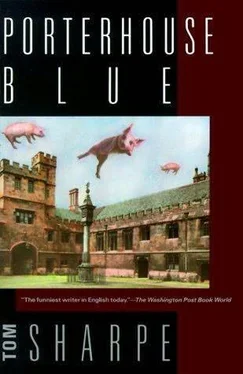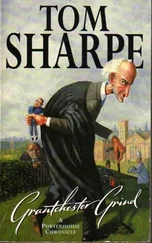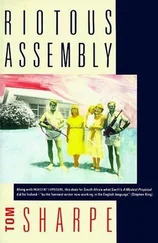Skullion sat in front of the gas fire in the Porter’s Lodge and smoked his pipe. His visit to Coft Castle had eased his mind. The General would use his influence to see that the Master didn’t make any changes. You could rely on the General. One of the old brigade, and rich too. The sort that always gave you a big tip at the end of term. Skullion had had some big tips in his time and he had put them all away in his bank with the shares old Lord Wurford had left him in his will and had never touched them. He lived off his salary and what he earned on his night off as a steward at the Fox Club. There had been some big takings there too in his time; the Maharajah of Indpore had once given him fifty quid after a day at the races, when a tip from Sir Cathcart’s stable-boy had paid off. Skullion considered the Maharajah quite a gent, a compliment he paid to few Indians, but then a Maharajah wasn’t a proper Indian, was he? Maharajahs were Princes of the Empire and as far as Skullion was concerned wogs in the Empire were quite different from wogs outside it and wogs in the Fox Club wasn’t wogs at all or they wouldn’t be members. The intricate system of social classification in Skullion’s mind graded everyone. He could place a man within a hair’s breadth in the social scale by the tone of his voice or even the look in his eye. Some people thought you could depend on the cut of a man’s coat but Skullion knew better. It wasn’t externals that mattered, it was something much more indefinable, an inner quality which Skullion couldn’t explain but which he recognized immediately. And responded to. It had something to do with assurance, a certainty of oneself which nothing could shake. There were lots of intermediate stages between this ineffable superiority and the manifest inferiority of, say, the kitchen staff, but Skullion could sense them all and put them in the right place. There was money by itself, brash and full of itself but easily deflated. There was two-generation money with a bit of land. Usually a bit pompous, that was. There was County rich and poor. Skullion noted the distinction but tended to ignore it. Some of the best families had come down in the world and so long as the confidence was there, money didn’t count, not in Skullion’s eyes anyway. In fact confidence without money was preferable, it indicated a genuine quality and was accordingly revered. Then there were various degrees of uncertainty, nuances of self-doubt that went unnoticed by most people but which Skullion spotted immediately. Flickers of residual deference immediately suppressed – but too late to be missed by Skullion. Doctors’ and lawyers’ sons. Professional classes and treated respectfully. Still public school anyway, and graded from Eton and Winchester downwards. Below public school Skullion lost all interest, according only slight respect if there was money in it for him. But at the top of the scale above all these distinctions there was an assurance so ineffable that it seemed almost to merge into its opposite. Real quality, Skullion called it, or even the old aristocracy to distinguish it from mere titular nobility. These were the saints of his calendar, the touchstone against which all other men were finally judged. Even Sir Cathcart was not of their number. In fact Skullion had to admit that he was fundamentally of the fourth rank, though near the top of it, and that was high praise considering how many ranks Skullion had in his mind. No, the real quality were without Sir Cathcart’s harshness. There was often an unassuming quality about the saints which less perceptive porters than Skullion mistook for timidity and social insecurity but which he knew to be a sign of breeding, and not to be taken advantage of. It accorded his servility the highest accolade, this helplessness that was quite unforced, and gave him the sure knowledge that he was needed. Under the cover of that helplessness Skullion could have moved mountains, and frequently had to in the way of luggage and furniture, humping it up staircases and round corners and arranging it first here and then there while its owner, graciously indecisive, tried to make up what there was of his mind where it would look best. From such expeditions Skullion would emerge with a temporary lordliness as if touched by grace and would recall such services rendered in years to come with the feeling that he had been privileged to attend an almost spiritual occasion. In Skullion’s social hagiography two names stood out as the epitome of the effeteness he worshipped. Lord Pimpole and Sir Launcelot Gutterby, and at moments of contemplation Skullion would repeat their names to himself like some isepetitive prayer. He was in the process of this incantation and had reached his twentieth “Pimpole and Gutterby” when the Lodge door opened and Arthur, who waited at High Table, came in.
“Evening, Arthur,” said Skullion condescendingly.
“Evening,” said Arthur.
“Going off home?” Skullion enquired.
“Got something for you,” Arthur told him, leaning confidentially over the counter.
Skullion looked up. Arthur’s attendance at High Table was a source of much of his information about the College. He rose and came over to the counter. “Oh ah,” he said.
“They’re in a tizzwhizz tonight,” Arthur said. “Proper tizzwhizz.”
“Go on,” said Skullion encouragingly.
“Bursar come in to dinner all flushed and flummoxy and the Dean’s got them high spots on his cheeks he gets when his gander’s up and the Tutor don’t eat his soup. Not like him to turn up his soup,” Arthur said. Skullion grunted his agreement. “So I know something’s up.” Arthur paused for effect. “Know what it is?” he asked.
Skullion shook his head. “No. What is it?” he said.
Arthur smiled. “Master’s called a College Council for tomorrow. The Bursar said it wasn’t convenient and the Master said to call it just the same and they don’t like it. They don’t like it at all. Put them off their dinner it did, the new Master acting all uppity like that, telling them what to do just when they thought they’d got him where they wanted him. Bursar said he’d told the Master they hadn’t got the money for all the changes he has in mind and the Master seemed to have taken it, but then he rings the Bursar up and tells him to call the meeting.”
“Can’t call a College Council all of a sudden,” Skullion said, “Council meets on the first Thursday of every month.”
“That’s what the Dean said and the Tutor. But the Master wouldn’t have it. Got to be tomorrow. Bursar rang him up and said Dean and Tutor wouldn’t attend like they’d told him and Master said that was all right with him but that the meeting would be tomorrow whether they were there or not.” Arthur shook his head mournfully over the Master’s wilfulness. “It ain’t right all this telling people what to do.”
Skullion scowled at him. “The Master come to dinner?” he asked.
“No,” said Arthur, “he don’t stir from the Lodge. Just telephones his orders to the Bursar.” He glanced significantly at the switchboard in the corner. Skullion nodded pensively.
“So he’s going ahead with his changes,” he said at last.
“And they thought they’d got him where they wanted him, eh?”
“That’s what they said,” Arthur assured him. “Bursar said he wasn’t going to do nothing and then he suddenly calls the meeting.”
“What’s the Dean say to all this?” Skullion asked.
“Says they’ve all got to stick together. Mind you, he didn’t have much to say tonight. Too upset by the look of him. But that’s what he’s said before.”
“Don’t suppose the Tutor agrees with him,” Skullion suggested.
“He do now. Didn’t before but this being told to attend the meeting has got him on the raw. Don’t like that at all, the Tutor don’t.”
Читать дальше












